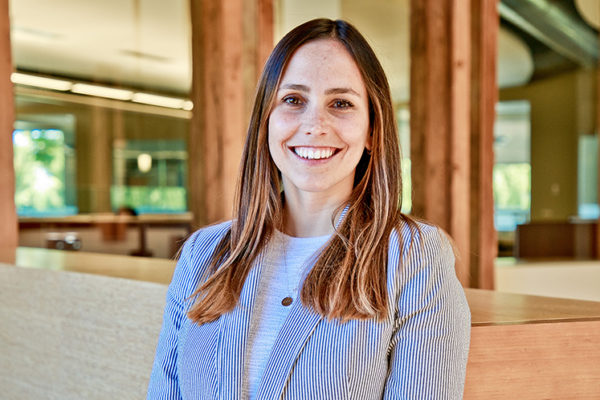A foundation that has set a goal this decade of identifying 50 inventors who will shape the next 50 years has added its second University of Texas at Austin faculty member to the list. The Gordon and Betty Moore Foundation announced Livia Eberlin, assistant professor in the Department of Chemistry, is one of this year’s five Moore Inventor fellows.
The fellowship program recognizes distinguished early-career innovators at universities across the U.S. and supports research efforts that have a high potential to accelerate progress in science, environmental conservation and patient care. Fellows receive $825,000 each over three years to drive their inventions forward, including $50,000 per year from their home institutions.
“Gordon Moore had a deep passion for science and invention. It was this purpose and drive that helped fuel the digital revolution and provided part of the rich history of science and invention at the core of Silicon Valley,” said Harvey V. Fineberg, M.D., Ph.D., president of the Gordon and Betty Moore Foundation. “These young inventors show great promise for creating positive outcomes for future generations.”
Watch a UT Austin video about Eberlin’s research: https://vimeo.com/299746084
Eberlin is developing new ways to identify cancerous tissue to improve outcomes for patients using a chemical analysis method called mass spectrometry. One tool she has developed, called the MasSpec Pen, enables a surgeon to rapidly differentiate cancerous tissue from healthy tissue directly in patients in a surgical setting, which might help them decide what to remove and what to leave intact. It can also be used on tissue samples taken from a patient to help clinicians diagnose disease and choose the most effective treatment option for an individual. Significant funding for Eberlin’s research comes from the Cancer Prevention and Research Institute of Texas.
“There is significant clinical evidence showing that removing all cancer during a first surgery leads to increased survival and chances of a cure for the patients,” Eberlin said. “So the implications could be huge for patient care. Also importantly, rapid and more precise surgeries and diagnosis are beneficial to the health care system, as surgeries become more efficient and second surgeries become less frequent, leading to decreased costs and time.”
This fellowship is the latest in a string of awards and honors for Eberlin. In 2018 alone, she received a prestigious MacArthur Foundation Fellowship, won the Interactive Innovation Award at South by Southwest and – just last week – was named UT Austin’s Emerging Inventor of the Year.
Eberlin received a B.S. (2007) from the Universidade Estadual de Campinas in Brazil and a Ph.D. (2012) from Purdue University. She was a postdoctoral fellow at Stanford University from 2012 to 2015 before joining the faculty of The University of Texas at Austin.
Eberlin joins UT Austin’s first Moore Inventor fellow, associate professor of engineering Deji Akinwande, who received an inaugural fellowship in 2016. UT Austin is one of only two institutions to have more than one researcher among the 15 Moore Inventor fellows named to date (the other being University of Wisconsin-Madison).
Other fellows named this year were Victor Brar, assistant professor of physics at the University of Wisconsin-Madison; Zachary Holman, assistant professor of electrical, computer and energy engineering at Arizona State University; Hal Holmes, lead engineer of the DNA Barcode Project at Conservation X Labs; and Prineha Narang, assistant professor of computational materials science at Harvard University.

